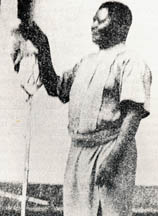Classic DACB Collection
All articles created or submitted in the first twenty years of the project, from 1995 to 2015.Kimbangu, Simon (A)

So called messianic religious leader; founding figure of Kimbanguism, one of the largest religious movements in modern Africa, he became a symbol of nationalism.
Educated at a mission of the Baptist Missionary Society, and baptized in 1915, he worked for the Mission as a teacher and evangelist. He later went as a migrant labourer to a Leopoldville (Kinshasa) but in 1921 returned to his home at N’Kamba. In response to what he regarded as divine compulsion he embarked on a mission of healing and preaching, which became a mass revival. Anti-European feeling on the part of many Kongo found an outlet in the movement, and the Baptist missionaries were divided over the part Kimbangu was playing. His ministry lasted from April to September 1921; he continued healing and teaching and opposed witchcraft and sorcery. As he attracted ever-increasing crowds the Belgian administration became alarmed, for the fear of a rising was always present. In September he was arrested, tried for sedition and on October 3 sentenced to death. However, the death sentence was commuted and he was flogged and then imprisoned in the eastern Congo, where he remained for the rest of his life.
During his trial Kimbangu consciously patterned his behaviour on that of Christ during his passion, and this image of a martyr-figure became idealized during the long imprisonment which cut him off from communication with his followers. Continued Belgian persecution of his adherents gave tangible support to the anti-European teachings of the Kimbanguists, and the movement flourished as an underground church. Some erstwhile adherents, such as Simon-Pierre MPADI, established their own churches, but all emphasized the symbolic leadership of Kimbangu. He also became a symbol of Kongo political separatism in western Zaïre, northern Angola and the French Congo - an idea later taken up by KASAVUBU.
Before Kimbangu entered prison in 1921, he is said to have predicted that his youngest son, Joseph Diangienda (1918- ) would become his successor. During the 1950s Diangienda reunited various Kimbanguist groups under his own leadership and established the Church of Jesus Christ on Earth through the prophet Simon Kimbangu (EJCSK). When the Belgian government granted sudden independence to the Congo in 1960, the ban on Kimbanguism was lifted and the EJCSK emerged as a national church. Under Diangienda’s leadership the church’s membership has grown and it now claims about three million adherents. In 1969 the EJCSK became the first independent African church to attain full membership in the World Council of Churches.
Mark R. Lipschutz and R. Kent Rasmussen
Bibliography
Chomé, Jules. La passion de Simon Kimbangu, 1921-1951. Brussels: Présence Africaine, 1959.
Andersson, Efraim. Messianic Popular Movements in the Lower Congo (Studia Ethnographica Upsaliensia XIV). Uppsala: Almqvist & Wiksell, 1958.
Balandier, Georges. The Sociology of Black Africa. Translated by D. Garman. New York: Praeger, 1970.
Barrett, David B. Schism and renewal in Africa. Nairobi: Oxford University Press, 1968.
——–. “Who’s Who of African Independent Church Leaders.” Risk (Geneva, W.C.C.) 7(3) (1971): 23-34.
Martin, Marie-Louise. Kimbangu. An African Prophet and His Church. Translated by D. M. Moore. Oxford: Basil Blackwell, 1975.
This article is reproduced, with permission, from Dictionary of African Historical Biography, 2nd edition, copyright © 1986, by Mark R. Lipschutz and R. Kent Rasmussen, University of California Press, Berkeley and Los Angeles, California. All rights reserved.
External links
Encyclopaedia Britannica (complete articles): Kimbangu, Simon, Kimbanguist Church



